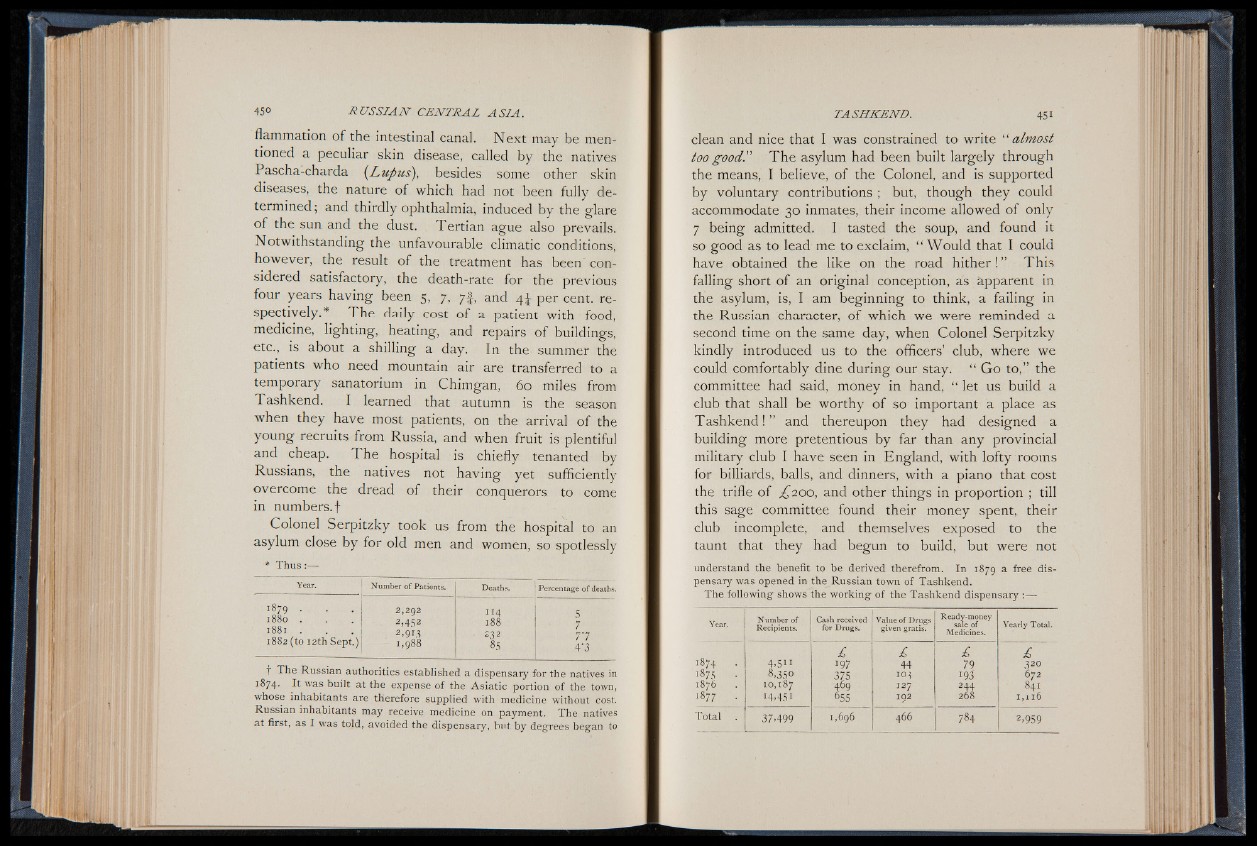
flammation of the intestinal canal. Next may be mentioned
a peculiar skin disease, called by the natives
Pascha-charda {Lupus), besides some other skin
diseases, the nature of which had not been fully determined;
and thirdly ophthalmia, induced by the glare
of the sun and the dust. Tertian ague also prevails.
Notwithstanding the unfavourable climatic conditions,
however, the result of the treatment has been'considered
satisfactory, the death-rate for the previous
four years having been 5, 7, 7§, and 4^ per cent, respectively.*
The daily cost of a patient with food,
medicine, lighting, heating, and repairs of buildings,
etc., is about a shilling a day. In the summer the
patients who need mountain air are transferred to a
temporary sanatorium in Chimgan, 60 miles from
Tashkend. I learned that autumn is the season
when they have most patients, on the arrival of the
young recruits from Russia, and when fruit is plentiful
and cheap. The hospital is chiefly tenanted by
Russians, the natives not having yet sufficiently
overcome the dread of their conquerors to come
in numbers, f
Colonel Serpitzky took us from the hospital to an
asylum close by for old men and women, so spotlessly
* Thus 1
Year. Number o f Patients. Deaths. Percentage o f deaths.
1879 . . .
1880 .
1881 .
1882 (to 12th Sept.)
2,292
2,452
M
1,988
■! 114
188
232
85
7
7 7
4 ‘3
t The Russian authorities established a dispensaiy for the natives in
1874. It was built at the expense of the Asiatic portion of the town,
whose inhabitants are therefore supplied with medicine without cost.
Russian inhabitants may receive medicine on payment. The natives
a t first, as I was told, avoided the dispensary, hut. by degrees began to
clean and nice that I was constrained to write “ almost
too good.” The asylum had been built largely through
the means, I believe, of the Colonel, and is supported
by voluntary contributions ; but, though they could
accommodate 30 inmates, their income allowed of only
7 being admitted. I tasted the soup, and found it
so good as to lead me to exclaim, “ Would that I could
have obtained the like on the road hither! ” This
falling short of an original conception, as apparent in
the asylum, is, I am beginning to think, a failing in
the Russian character, of which we were reminded a
second time on the same day, when Colonel Serpitzky
kindly introduced us to the officers’ club, where we
could comfortably dine during our stay. “ Go to,” the
committee had said, money in hand, “ let us build a
club that shall be worthy of so important a place as
Tashkend! ” and thereupon they had designed a
building more pretentious by far than any provincial
military club I have seen in England, with lofty rooms
for billiards, balls, and dinners, with a piano that cost
the trifle of ^200, and other things in proportion ; till
this sage committee found their money spent, their
club incomplete, and themselves exposed to the
taunt that they had begun to build, but were not
understand the benefit to be derived therefrom. In 1879 a free dispensary
was opened in the^Russian town of Tashkend.
The following shows the working of the Tashkend dispensary :—
Year. Number o f
Recipients.
Cash received
for Drugs.
Value o f Drugs
given gratis.
Ready-money
sale of
Medicines.
Yearly Total.
£ i I £
1874 . 4 .5 1 1 197 44 79 320
1875 8,350 375 101 » 672
1876 10,187 469 127 244 841
1877 • 14,451 655 102 268 1 ,1 1 6
Total 37,499 1,696 466
00
2,959